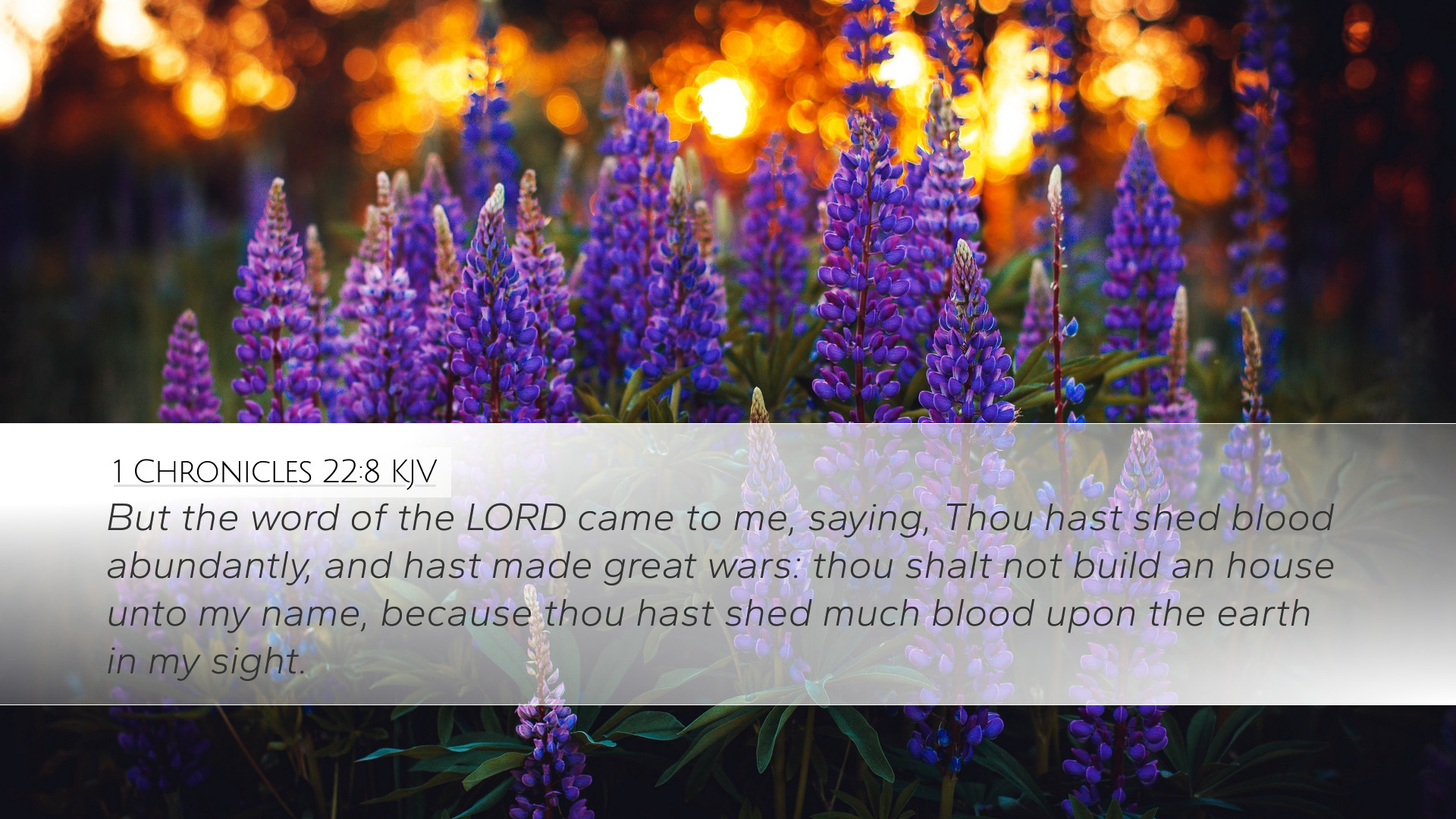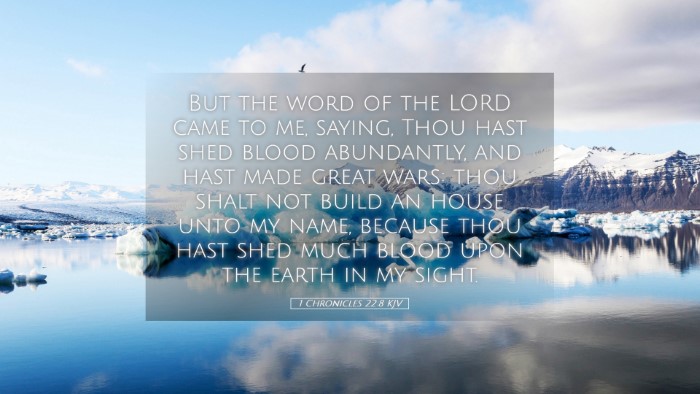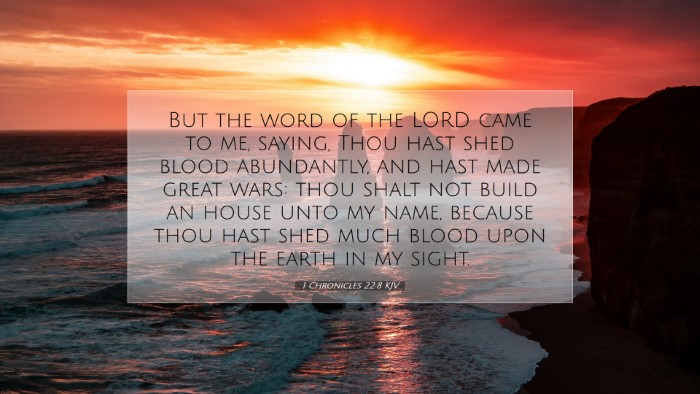Commentary on 1 Chronicles 22:8
1 Chronicles 22:8 states:
"But the word of the Lord came to me, saying, You have shed much blood and have waged great wars. You shall not build a house for my name, because you have shed so much blood before me on the earth."
Introduction
This verse serves as a pivotal moment in the narrative of King David's ambitions to build a temple for the Lord. It encapsulates the themes of divine purpose, human endeavor, and the consequences of one's actions. Through the lens of various public domain commentaries, we gain profound insights into the significance of this declaration and its implications for David, Israel, and the future temple.
The Divine Response
In the context of the passage, God's response to David reveals a critical truth: the holiness of God and His plans cannot be contingent upon human actions, particularly those marked by violence or bloodshed.
- Matthew Henry Commentary: Matthew Henry points out that God’s refusal to allow David to build His house emphasizes that God chooses His instruments based not just on their intentions but on their actions. David's military conquests, though glorious in the eyes of men, were marred by the blood shed, which God holds in solemn regard.
- Albert Barnes Notes: Barnes elaborates that this decision underscores God's sovereignty over who acts as a servant in establishing His kingdom. David’s heart was right, but his hands were not clean -- a crucial reminder that God often refines His plans through our shortcomings.
- Adam Clarke's Commentary: Clarke reflects on the nature of God’s command, emphasizing that God’s house must be built in peace and not in the context of war, indicating a deeper theological principle about the nature of worship and sanctuary.
The Consequence of Bloodshed
The phrase "You have shed much blood" carries significant weight: It reflects not only the physical act of warfare but also the moral and spiritual implications of such actions.
- Henry notes: The bloodshed serves as a symbol of David’s past, impacting his present. It is a reminder that with great power comes great responsibility, and the impacts of violent actions extend beyond the immediate outcomes.
- Barnes emphasizes: God's instruction to David illustrates a profound truth in leadership -- that the character of a leader affects the community they lead. Thus, God’s rejection of David as the builder was as much about the king as it was about the future of Israel.
- Clarke reinforces: The emphasis on bloodshed suggests that God requires clean hands and pure hearts in those who approach Him in worship, a principle that resonates throughout the biblical narrative.
David's Heart and God's Plan
David's desire to build the temple illustrates the passion and zeal of a leader who seeks to honor God.
- Matthew Henry points out: Despite God's rejection, it is evident that David’s intentions were noble. This reflects the theme that God values the heart’s desire, even when the outcome is not as planned.
- Barnes comments: God’s decision doesn’t negate David’s faithfulness or his role in God’s plan. Instead, it redirects David’s energy into preparing for the future — a significant act of humility and submission to divine will.
- Clarke adds: This passage encourages believers to recognize that God’s plans may involve various stages, and sometimes what we envision may not align with God’s design for us.
Preparation for the Future
This divine revelation leads to practical outcomes, highlighting the importance of preparation and legacy.
- Henry reflects: Although David was not to build the temple, he was still called to prepare for its construction. This signifies the continuity of God's work, showing that even when one is set aside, their efforts can still contribute to a larger purpose.
- Barnes mentions: David’s subsequent preparations, including gathering materials and establishing plans, reflect a readiness to obey God's command, thus underscoring the lesson of obedience in the face of disappointment.
- According to Clarke: This scenario encourages modern believers to engage in acts that contribute to the faith community, recognizing that the seed of a legacy often grows in unexpected ways.
Lessons for Today
The implications of 1 Chronicles 22:8 extend far beyond David and even the ancient Israelite context. Here are several key lessons that resonate with contemporary audiences, especially pastors, theologians, and scholars:
- The Importance of Clean Hands: The call for moral integrity in leadership remains vital. Any ministry or service to God must stem from a heart that prioritizes purity and righteousness.
- Human Intent vs. Divine Will: This passage reminds believers that our plans may not align with God’s purposes, calling them to a posture of humility and adaptability in all endeavors.
- Preparation is Key: God may redirect plans, but this should not deter us from preparing for the future work of the Kingdom. Time spent in preparation is never wasted when directed towards God’s service.
- Legacy Matters: The actions taken today, although focused on present desires, pave the way for future generations in faith. David’s actions set the stage for Solomon, and likewise, our current actions can impact generations to come.
Conclusion
1 Chronicles 22:8 not only serves as a defining moment in David's life but as an enduring lesson about the nature of God's calling, the weight of our actions, and the intricacies of divine purpose. As we reflect on this passage with insights from notable commentaries, we are encouraged to pursue holiness, engage in diligent preparation, and trust in God's perfect plans for each of our lives.


